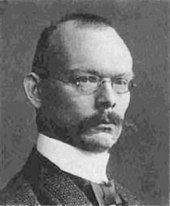Ernst Siehr
Ernst Ludwig Siehr (born October 5, 1869 in Heinrichswalde , Niederung district , East Prussia; † November 14, 1945 in Bergen on Rügen ) was a German politician ( Progressive People's Party , DDP ).
Life
After graduating from high school in Insterburg , Ernst Siehr, who was a Protestant, studied law from 1886 to 1889 at the Albertus University in Königsberg , the Ludwig Maximilians University in Munich and the Friedrich Wilhelms University in Berlin . During his studies he joined the Königsberger Landsmannschaft Littuania. Having become a trainee lawyer at the age of 19, he passed the assessor exam with “good” in 1894. He settled in Insterburg as a lawyer in 1895 . Until 1911 he was part-time lawyer of the Insterburg Chamber of Commerce . In that year he was also licensed as a notary . During the First World War he was deployed to the rank of lieutenant in the mobile Landsturm battalion Insterburg. He was awarded the Iron Cross, 2nd class. Siehr was a member of the German Peace Society , the East Prussian Provincial Association for the Promotion of River and Canal Shipping and the Historical Commission for East and West Prussian State Research . In 1929 he was awarded an honorary doctorate from the University of Königsberg and honorary citizenship of the city of Insterburg. On February 3, 1940, he received the Corps Littuania ribbon .
politics
Siehr was initially a member of the Progressive People's Party , where she headed the party structure for East Prussia . In 1918 he participated in the founding of the German Democratic Party , in which he was also chairman for East Prussia. Siehr belonged to the city council of Insterburg and was its deputy head. From 1921 to 1925 Siehr represented Allenstein in the provincial parliament of the province of East Prussia . He was also vice president of the provincial council. He was elected a member of the Reichstag in the Reichstag election in 1912 in the Reichstag constituency of Gumbinnen 3 . The electoral period of this Reichstag lasted until the end of the First World War. In January 1919 he was elected to the Weimar National Assembly; he was a member of the Reichstag until the new election of the East Prussian MPs on February 20, 1921 .
Public offices
Siehr described the Versailles Peace Treaty as a "document of insane addiction to destruction, blind rush of victory and political short-sightedness." After the Kapp Putsch , Siehr was appointed Chief President of the Prussian province of East Prussia on April 16, 1920 because his predecessor August Winnig ( SPD ) was on the Side of the putschists. During Siehr's term of office, the referendums in Masuria and West Prussia fell on July 11, 1920 about belonging to East Prussia or Poland. Siehr's unauthorized regulation of a full three-year closed season for moose was a blessing. In 1922 he implemented the East Prussia program , which in 1926 became Osthilfe (German Reich) . With it, the Reich government and the Prussian state government tried to alleviate the structural disadvantages of the province, which had arisen through the spatial separation from the Reich. At his own request on August 1, 1932, Siehr's term of office as Oberpräsident ended on September 30, 1932, due to differences with the reactionary government installed by Reich Chancellor Franz von Papen in the “ Prussian strike ”. His successor was Wilhelm Kutscher .
Publications
- East Prussia . Zentralverlag, Berlin 1928.
literature
- Martin Schumacher (Hrsg.): MdR The Reichstag members of the Weimar Republic in the time of National Socialism. Political persecution, emigration and expatriation, 1933–1945. A biographical documentation . 3rd, considerably expanded and revised edition. Droste, Düsseldorf 1994, ISBN 3-7700-5183-1 .
Web links
- Literature by and about Ernst Siehr in the catalog of the German National Library
- Ernst Siehr in the database of members of the Reichstag
- Culture portal West and East Prussia
Individual evidence
- ↑ Kösener Corpslisten 1960, 86/969.
- ↑ Directory of members of the East Prussian Provincial Parliament (Korfmacher)
- ^ Imperial Statistical Office (ed.): The Reichstag elections of 1912 , Issue 2 (= Statistics of the German Reich, Vol. 250). Verlag von Puttkammer & Mühlbrecht, Berlin 1913, p. 83; Carl-Wilhelm Reibel: Handbook of the Reichstag elections 1890-1918. Alliances, results, candidates (= handbooks on the history of parliamentarism and political parties. Volume 15). Half volume 1, Droste, Düsseldorf 2007, ISBN 978-3-7700-5284-4 , pp. 43-46.
- ↑ Gerd Brausch: Stayed in the heart of his homeland. 125 years ago, Upper President Dr. Ernst Siehr was born in Heinrichswalde . Ostpreußenblatt, volume 41, October 15, 1994, p. 12 f.
- ↑ Siehr, Ernst Ludwig , on kulturportal-west-ost.eu, accessed on June 17, 2018
| personal data | |
|---|---|
| SURNAME | Look, Ernst |
| ALTERNATIVE NAMES | See you, Ernst Ludwig |
| BRIEF DESCRIPTION | German politician (FVP, DDP), MdR |
| DATE OF BIRTH | October 5, 1869 |
| PLACE OF BIRTH | Heinrichswalde |
| DATE OF DEATH | November 14, 1945 |
| Place of death | Mountains on Rügen |


